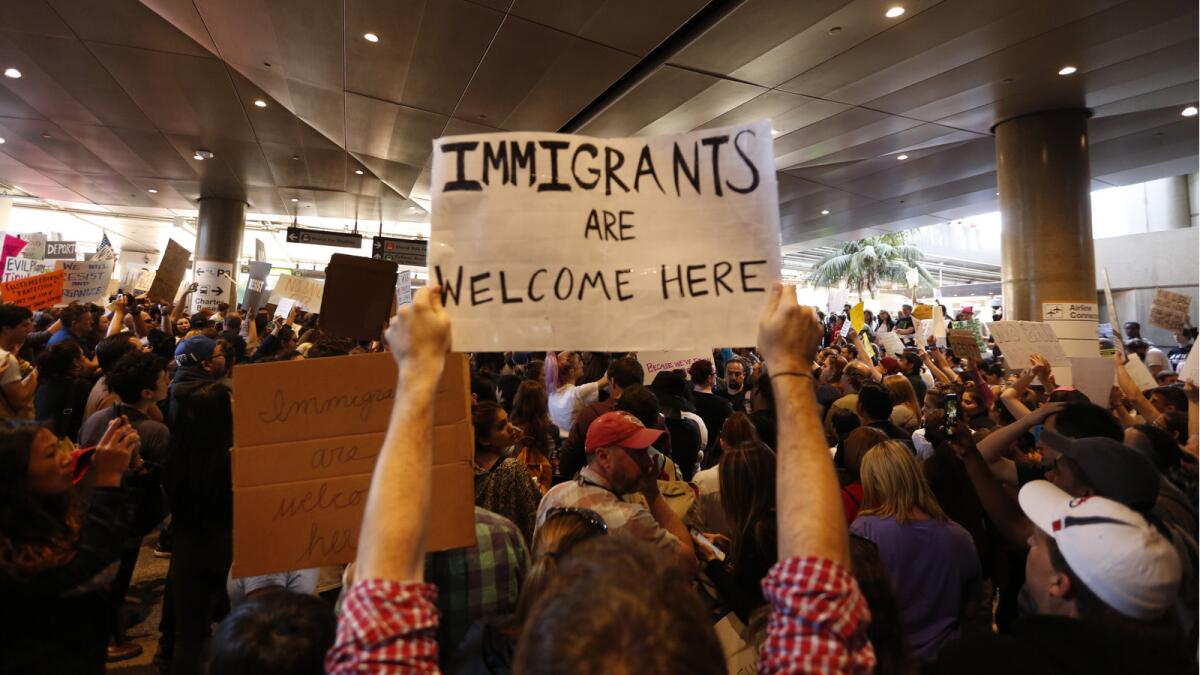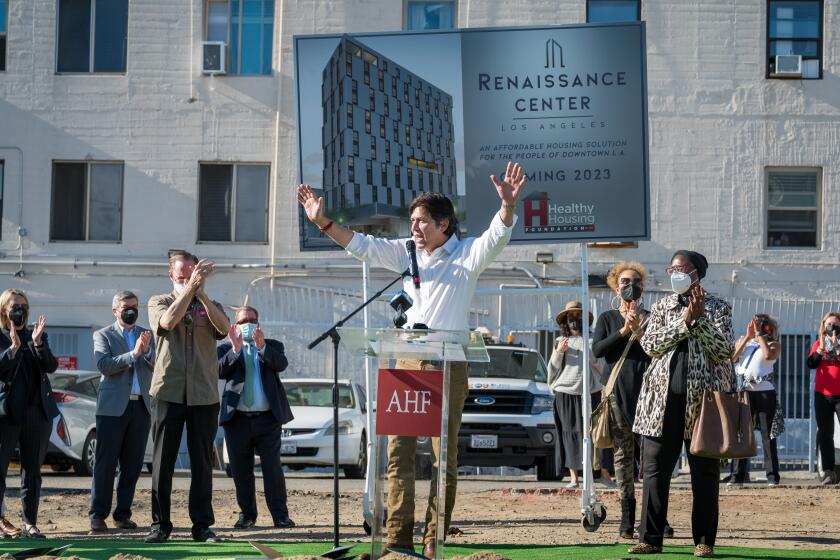Trump expands ‘travel ban’ to six more countries, but true impact unclear

- Share via
WASHINGTON — President Trump on Friday marked roughly three years since his controversial travel ban by announcing the addition of six African and Asian countries to the list of those whose nationals face restrictions on travel to the United States.
The Homeland Security and State departments announced that the administration was adding Kyrgyzstan, Myanmar, Eritrea, Nigeria, Sudan and Tanzania to the list. More than 80% of those potentially affected by the new ban are from the four African countries, according to America’s Voice, an organization advocating for immigration reform.
Administration officials said Friday that the measure would not necessarily block all citizens of those nations from entering the United States, affecting only “limited categories” of travelers. U.S. officials will stop issuing certain visas to potential immigrants from Kyrgyzstan, Myanmar, Eritrea and Nigeria, and diversity visas, obtained by lottery for those whose countries have low rates of U.S. immigration, will no longer be issued to Sudanese and Tanzanians.
The new restrictions will not apply to tourist or business travel, White House Press Secretary Stephanie Grisham said in a statement Friday.
The State Department has put increasing pressure on countries it deems “recalcitrant” for not adopting electronic passports with biometric data and agreeing to certain information-sharing with the United States.
Trump issued a proclamation making the expanded group official on Friday, but the new restrictions won’t take effect until Feb. 22, officials said.
“As president, I must continue to act to protect the security and interests of the United States and its people,” Trump said. “I remain committed to our ongoing efforts to engage those countries willing to cooperate.”
Rep. Joe Neguse (D-Colo.), the son of Eritrean refugees who came to the United States nearly 40 years ago, criticized the decision Friday.
Two years ago, in January 2018, Neguse said he saw his daughter for the first time, on an ultrasound. That same day, Neguse, who was then running for Congress, heard reports that Trump had called African nations “shithole countries,” asking why the United States couldn’t give preference to those from majority-white countries, such as Norway. Neguse said he worried his daughter would face discrimination, worsened by the rhetoric coming out of the White House.
“Would she be able to live her dream in the same way I and my parents had been able to, in light of the president’s discriminatory attitudes toward certain people, and the way those attitudes have been reflected in public policy?” recalled Neguse, who was elected in 2018, when Democrats took control of the House.
Trump confirmed plans to broaden the ban at the World Economic Forum in Davos, Switzerland, last week, saying, “We’re adding a couple of countries to it. We have to be safe.”
Neither the president nor Homeland Security and State Department officials have detailed any specific threats to U.S. security posed by travelers from these nations. Trump’s proclamation said the additions were made as a result of a recent security assessment, part of a “comprehensive worldwide review” of about 200 countries initiated in 2017.
The White House had intended to expand the ban on Monday, to coincide with the anniversary of the original ban, enacted a week after Trump took office. The initial order targeted seven Muslim-majority countries and was met by nationwide protests at airports, chaos at the Homeland Security Department and lawsuits that ultimately forced the administration to modify the measure.
In June 2018, the Supreme Court allowed a third version of the order to take effect, restricting entry from many citizens of Iran, Libya, Somalia, Syria, Yemen, Venezuela and North Korea, while removing Chad from the list because, in the administration’s view, the country had made “improvements” in security precautions.
“The ban should be ended, not expanded,” Omar Jadwat, director of the ACLU’s Immigrants’ Rights Project, said Friday.
Acting Homeland Security Secretary Chad Wolf was set to announce the new ban Friday just hours ahead of a crucial vote on one of the last remaining barriers to Trump’s near-certain acquittal by the Senate in his ongoing impeachment trial.
Ultimately, days before the Iowa caucuses and the president’s State of the Union address, the department was forced to quietly release the details Friday with little fanfare — an unexpected development from an administration eager to claim victories on the president’s promises to restrict immigration as he intensifies his campaign for reelection in 2020.
The Trump administration has expanded a policy regime effectively blocking asylum seekers at the U.S.-Mexico border — which have increasingly included Africans — and slashing U.S. refugee admissions to among their lowest levels.
The new iteration of the “travel ban” may be intended more for leverage and political messaging than its practical impact on travelers from the six countries. Homeland Security officials told several of the countries they could avoid being named on the list if they made changes before the announcement, the Associated Press reported.
Rep. Sheila Jackson Lee, a Democrat representing Houston, which has one of the largest populations of Nigerians outside of West Africa, said the Trump administration did not consult with leadership in Congress on whether the measure would improve U.S. security. She pledged “major lawsuits” in response, saying, “We don’t expect to lay down on this.”
House Judiciary Committee Chairman Jerrold Nadler (D-N.Y.) and immigration and citizenship subcommittee Chairwoman Zoe Lofgren (D-San Jose) said in a statement Friday they are pursuing the repeal of both bans. The administration, they said, is stretching the Immigration and Nationality Act, the foundation of the U.S. immigration system, “beyond its limits.”
“The president is once again rewriting our nation’s immigration laws,” they said.
More to Read
Get the L.A. Times Politics newsletter
Deeply reported insights into legislation, politics and policy from Sacramento, Washington and beyond. In your inbox twice per week.
You may occasionally receive promotional content from the Los Angeles Times.











